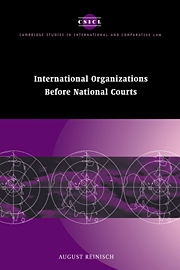Book contents
- Frontmatter
- Contents
- Preface
- Acknowledgements
- Table of cases
- Table of legal instruments
- List of abbreviations
- 1 Purpose, subject and methodology of this study
- PART I DESCRIPTIVE ANALYSIS
- PART II POLICY ISSUES
- PART III FUTURE DEVELOPMENTS
- Bibliography
- Index
- Cambridge Studies in International and Comparative Law
Preface
Published online by Cambridge University Press: 18 December 2009
- Frontmatter
- Contents
- Preface
- Acknowledgements
- Table of cases
- Table of legal instruments
- List of abbreviations
- 1 Purpose, subject and methodology of this study
- PART I DESCRIPTIVE ANALYSIS
- PART II POLICY ISSUES
- PART III FUTURE DEVELOPMENTS
- Bibliography
- Index
- Cambridge Studies in International and Comparative Law
Summary
My interest in the subject-matter of this book arose rather incidentally when I attended the 1992 Centre for Studies and Research seminar of the Hague Academy of International Law on ‘The External Debt’. It was my task there to focus on responsibility issues concerning debt rescheduling and the international debts crisis; one of the side issues that emerged from this investigation was whether international organizations could be made responsible or liable for part of the crisis and, if so, whether international or national fora would be available to adjudicate such claims. As far as the latter were concerned, it was apparent that immunity from jurisdiction could impede the enforcement of liability. At first, I simply assumed that international organizations would enjoy a similar degree of immunity as states. After a second look, I realized, however, that most applicable international agreements and domestic statutes provided for functional and/or absolute immunity without making explicit what this difference implied. Later on, I found that some national courts, in particular, in the US and Italy, are in fact using a state immunity standard. It appeared that no predictions about any judicial outcomes could be readily made.
To some extent my book is an attempt to find answers to this puzzle. Its subject was soon broadened to include all the various types of reasoning employed by national courts when they have to decide whether or not they will hear cases involving international organizations.
- Type
- Chapter
- Information
- International Organizations before National Courts , pp. xi - xiiPublisher: Cambridge University PressPrint publication year: 2000

